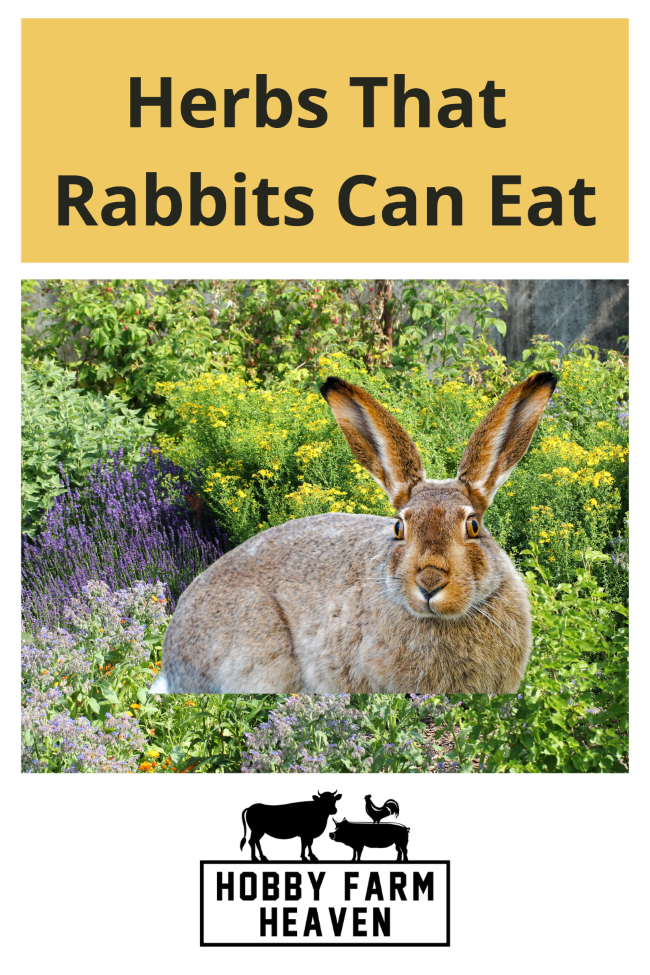The Best Herbs for Rabbits
If you are raising a farm, homestead, or pet rabbit you already know how important high fiber is to their wellbeing.
Rabbits are natural vegetarians that require lots of high fiber plant foods to support their highly specialized digestive system, keep their testy gut bacteria happy, and power all metabolic processes.
That said, leafy greens and herbs are great, nutrient dense supplements to any mature rabbit’s diet, if they are offered in moderation.
Why leafy greens for rabbits in moderation? Because leafy green herbs are high in nutrients, vitamins, natural antioxidants and natural anti-inflammatories, but contain zero to no fibers!
As such, green herbs can greatly boost the long term health of your bunnies but only if fed to them in low quantities. You will see that your rabbit quickly develops digestive issues, bad eating habits, and diarrhea if greens herbs are eaten too often.
Along with feeding your rabbits herbs comes many questions, such as:
- What is a leafy green herb?
- How many herbs can rabbits eat?
- What are the best herbs to offer your rabbits?
- Which herbs should your rabbit not eat?
- What is the best way to offer leafy greens to rabbits?
- Can all rabbits enjoy leafy green herbs?
We will cover the answers to all of these questions in more in this post, so read on and learn all you need to know about the best herbs for rabbits.
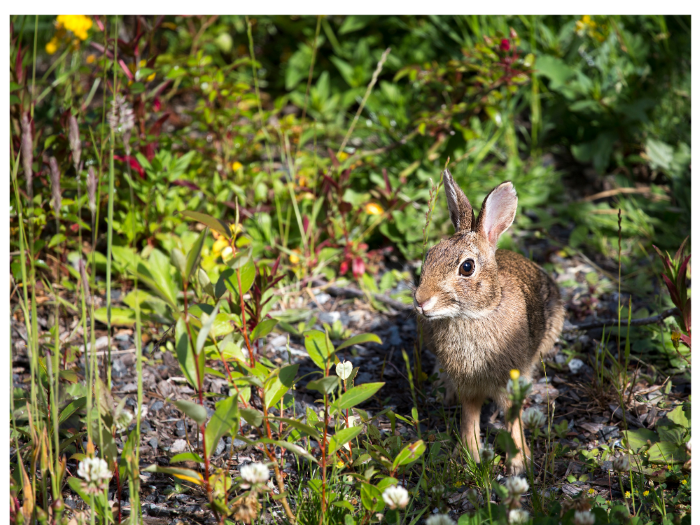
What Is A Leafy Green Herb
Oxford Dictionary defines an herb as ‘any plant with leaves, seeds, or flowers used for flavoring, food, medicine, or perfume’. And botanically speaking, an herb is a flowering plant that is non-woody and dies down to the ground after its growing season.
The term “leafy green” helps specify that we are talking about the green leafy part of the herb that contains the beneficial compounds and nutrients more so than the roots or bulbs.
How Much Herbs Can Rabbits Have
The best daily diet of a mature rabbit consists of the following:
- Unlimited hay (75% to 80% hay)
- Quality pellets (10% to 15%)
- Leafy green vegetables (5% to 10%)
Unlimited hay makes up the majority of a rabbit’s diet because it ensures they are ingesting the high fibers that their specialized digestive and metabolic systems require.
Rabbits have evolved to metabolize a high fiber diet thanks to special gut bacteria; daily high fiber is now something that all rabbits require.
In fact, rabbits’ guts are much more sensitive than other mammals and they need more daily fiber than other vegetarian mammals.
A low-fiber diet (which happens if leafy green herbs are offered too often or too much) will quickly result in imbalanced gut bacteria which will cause stomach upset, digestive issues, bad eating habits, diarrhea and defecation problems, and even deadly GI stasis.
Knowing this, we usually offer no more than 2-3 stems or sprigs of any given herb to our mature rabbits on any given day. This ensures that leafy greens are not consisting of more than the recommended 5-10%.
Herbs For Rabbits: What Are The Best Herbs To Offer Your Rabbits?
There are many herbs to choose from when offering your rabbits leafy greens.
It is important to note that not all herbs are rabbit-safe due to rabbits’ increased system sensitivity and the large range of natural (but sometimes harmful) compounds that are found within plants.
To make sure you offer your bunnies only the best leafy green options, we will go through rabbit-safe herb options as well as all herbs you should be wary of or avoid.
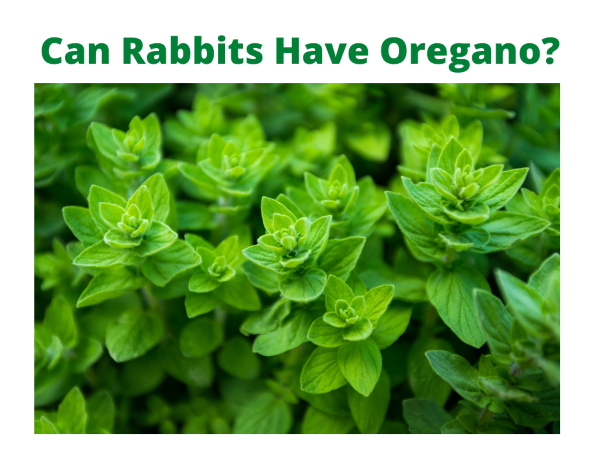
Safe Herbs For Rabbits – Top Tier
The safest herbs for rabbits to enjoy are those that we also enjoy because of their culinary and medicinal values.
These herbs are chock full of great vitamins, minerals, and compounds that strengthen the health of your rabbit and can act as natural remedies for minor digestive issues, stresses, and more.
Oregano
Can rabbits eat Oregano? Good question, the answer is yes, mature rabbits can eat oregano as it is a highly nutritious leafy green.
To start, oregano contains six antioxidants and can assist with inflammation relief, digestive issues, and sore muscles. Oregano is a great herb that can be offered to your rabbit every day.
It is simply important to make sure this herb doesn’t make up more than 5-10% of your rabbits daily diet.
This general rule ensures your rabbit is still ingesting enough high fibers, as oregano contains less than 0.5g of fiber per serving.
Basil
Rabbits enjoy basil for its aromatic quality and strong flavor. Although basil is a non-toxic herb, this vitamin packed green isn’t for all rabbits; don’t be surprised if the smell and flavor is too strong for your bunny!
Is basil good for rabbits? Absolutely, feel free to encourage measured basil ingestion to help naturally alleviate stress, support liver health, and reduce high blood sugar in your mature rabbits.
Dill
Dill is an easy favorite for rabbits. The fresh green leaves and stems of dill herb are nutritious and flavorful treats for your mature bunnies.
If you’re curious about the nutritional value of dill for rabbits, you’ll be pleased to learn that it contains two essential nutrients and seven minerals, one of which is manganese, an important mineral that supports healthy brain and nervous system functions.
Cilantro
Cilantro is a great leafy green herb option for your bunnies!
Our rabbits usually get very excited when they smell the herb and have always enjoyed the watery, fresh treat. While it does provide vitamins and minerals, cilantro doesn’t contain dense, necessary nutrients for rabbits, including fiber or proteins.
And cilantro does contains natural antimicrobial and anticonvulsant properties that can support aged or stressed rabbits!
Parsley
A classic herb found in many home gardens, parsley is a great leafy green herb that mature rabbits will eat. Parsley acts as a natural anti-inflammatory and antioxidant while also containing Vitamin K, an important nutrient that supports heart and kidney health in rabbits.
Thyme
Do rabbits eat thyme? Yes they do! Thyme herb is a healthy leafy green that can be added as a supplement to your mature rabbit’s everyday high fiber diet.
Fresh green thyme is the most delicious and nutritious form of the herb for rabbits. Fresh thyme contains natural anti-inflammatories and anti-infection compounds. Without doubt, when given in proper amounts, thyme is very good for rabbits.
Lemon Balm
Can rabbits eat lemon balm? Yes, lemon balm is another great green herb option for mature rabbits.
In fact, the properties of lemon balm can help assuage indigestion and stress that your rabbit is experiencing. But remember, this herb doesn’t contain high fibers and should only be offered to your rabbits as a treat.
Chamomile
This herb and its variations are nontoxic to your bunnies and, if offered in moderation, can greatly support their health and happiness.
Chamomile’s nutritional benefits for rabbits include antimicrobials and antifungals like α-bisabolol, cyclic ethers, and umbelliferon.
Chamomile also contains pharmacologically active compounds that can boost the health of your rabbit.

Best Herbs for Rabbits – Second Tier
Mint
Do rabbits eat mint? Yes, mature rabbits can enjoy mint in moderation.
This delicious herb offers a number of health benefits, including soothing effects and high amounts of magnesium and potassium to assist with energy production and nerve signaling.
However, you must be aware that the wrong type of mint can put rabbits at risk. Pennyroyal mint is the only toxic mint variant, do NOT offer pennyroyal mint to your bunnies.
Tarragon
Without doubt, when given in proper amounts, tarragon is very good for rabbits. This leafy green herb offers immune system support for rabbits through the vitamins and minerals it contains. How often can rabbits eat tarragon? Well, as often as everyday as long as it doesn’t make up more than 5-10% of your mature rabbit’s diet!
Remember, tarragon herb is low in fiber and should be treated as a dietary supplement for your rabbits.
Tarragon also has a strong scent and flavor, so don’t be surprised if your rabbit is repelled by this aromatic herb.
Rosemary
The nutritional value of rosemary for rabbits is unimpressive when it comes to proteins and fibers, but this herb makes up for it in the bountiful phytochemicals, antioxidants, antifungals, anti-bacterials, and antivirals it contains.
As such, rosemary is an ideal herb to offer your mature rabbits as a dietary supplement.
Keep in mind that this pungent herb may not be for all bunnies. Rabbits love to nibble greens, but many find the strong flavor and scent of rosemary unappealing, so don’t be worried if your rabbit refuses this herb.
Lavender
Lavender is known for its spicy scent and flavor thanks to its more than 300 compounds that help out with gastrointestinal issues, microbial and fungal infections, stress and anxiety, respiration issues, and even cardiovascular issues.
So, will rabbits eat lavender? Well, lavender is a rabbit-safe herb, but many bunnies find its pungent scent and flavor to be repelling. So don’t be surprised if your rabbit refuses this herb when it’s offered.
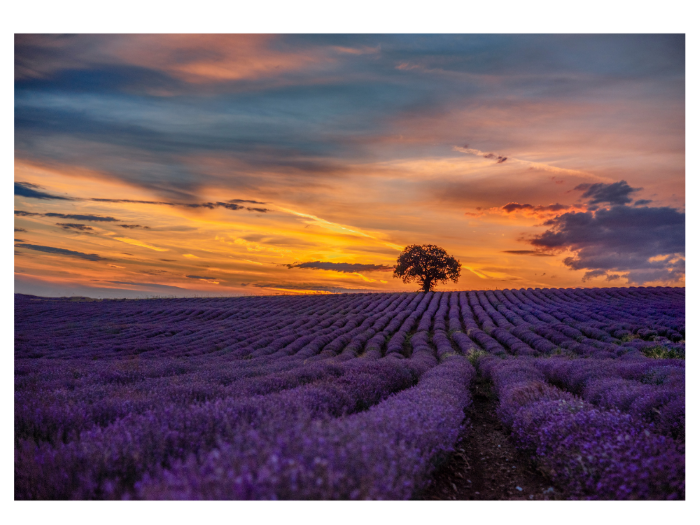
Other Rabbit Safe For Plants
If you’re looking for other rabbit-safe plants, think about the ones we humans enjoy over common ornamental and exotic species.
Culinary herbs that we’ve gone over, dark greens such as spinach, or crunchy celery are all healthy and safe treat options for your rabbits.
Remember that these plants do NOT provide the high fiber that your rabbits require, so always offer these plants in moderation, keeping them to no more than 5-10% of your rabbits diet and making sure high quality, high-fiber hay makes up 70-80% of their diets.
Unsafe Herbs for Rabbits
Sage
Mature rabbits can eat small amounts of sage as it is a comestible herb.
While it is a good source of Vitamin K, Vitamin B6, and Iron, sage is low in fiber and contains a compound called thujone, which has been found to be toxic to animals in large doses. Is sage safe for rabbits? Sage is still a rabbit-safe herb if you only offer a bit (well below 5-10% of rabbits’ diets) to mature rabbits.
However, we do not recommend offering sage to your rabbits often.
Chives
Chives are high in Vitamin K which is essential in developing good bone density and mature rabbits can eat very small quantities of chives without negative effects.
However, chives should not be your first green herb choice for your rabbits.
Chives are naturally acidic, contain sulfur that can be tough on rabbit’s sensitive GI tract, and lots of calcium which encourages calcification in rabbit kidneys, ureters, bladder and urethra. We recommend against offering chives to your rabbits. To learn more about chives, read our article Can Rabbits eat Chives?
Lemongrass
Is lemongrass good for rabbits? Lemongrass is chock full of an impressive array of essential nutrients that are immediately available to your mature rabbits when ingested.
However, lemongrass also contains natural acidic components.
For this reason lemongrass is a rabbit-safe herb, but only when offered in moderation, as acidic foods can quickly cause imbalances in rabbits’ sensitive gut bacterias and digestive tracts.

Other Unsafe Plants For Rabbits
When it comes to offering plants to rabbits, there are a large number of outdoor and indoor plants that are best to avoid due to toxic compounds, oxalate crystals, or other harmful secondary plant compounds. Here is a general list of plants poisonous to rabbits:
- Aloe
- Chrysanthemum
- Eucalyptus
- Larkspur
- Lilies
- Milkweed
- Nightshades
- Onion
- Poison Ivy and Poison Oak
- Potato Plants
- Monstera Plant
How To Feed Herbs To Rabbits
Now that you have a general understanding of safe and unsafe herbs for rabbits, let’s go over the best way to prepare and offer rabbit-safe herbs to your farm, homestead, or pet rabbits.
Follow these steps when preparing leafy green herbs for your mature rabbits:
- Choose only green herbs. Avoiding wilted, yellowed, or insect eaten plants.
- Inspect the herb well and remove any insects or slugs.
- Wash the herb in cool water, removing any residual dirt and potential pesticides.
To feed green herbs to your rabbits:
- Place a bit of washed herb into a clean bowl.
- Place this bowl in the hutch or house of your rabbit.
- Allow your rabbit to enjoy the nutritious herb.
- Be sure to remove the feeding bowl and any excess plant later in the day.
It is also a great idea to mix a small amount of herb in with the unlimited hay that your rabbits enjoy daily. This method allows your bunnies to appreciate the benefits of the leafy green while ensuring they’re ingesting high fibers!
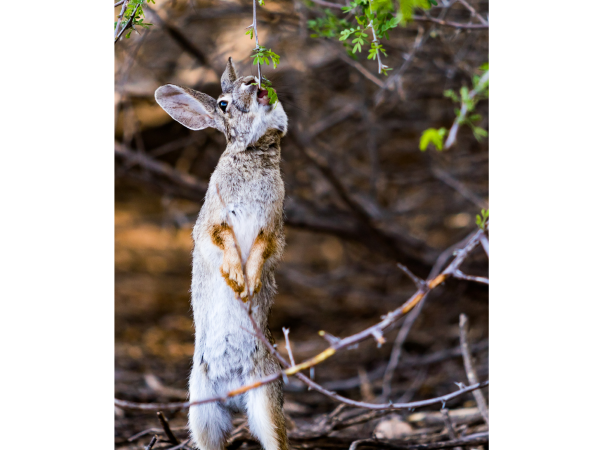
Here at Hobby Farm Heaven we believe in the natural benefits of herbs. We do our best to practice the “Herb of the Week” plan.
What is the Herb of the Week plan?
The Herb of the Week plan is where we feed a different herb to our rabbits each week.
How do we do this? Most often we mix a few sprigs of the Herb of the Week in with the rabbits’ hay, whenever we feed hay. This is easy and hassle free.
The Best Herbs For Rabbits: Concerns and Risks
Parasites
Any plant can host parasites, so it is extremely important to inspect your herbs well and remove any bugs, slugs, or insect eggs before offering it to your rabbits.
Pesticides
Unless you offer your rabbit your own home-grown pesticide free herbs, it is very important to wash all leafy greens well in cool water before offering them to your bunny to remove any residual pesticides.
Over Ripened Herbs
Over ripened herbs refers to any herb that is starting to wilt, yellow in color, or is wet and rotted. Avoid giving your bunnies over ripened herbs as they can cause illnesses and digestive issues.
Overfeeding Your Rabbit Herbs
Remember, your mature rabbits require a high-in-fiber diet due to their highly specialized stomach and digestive system.
It is important to only offer your rabbits best herbs as a treat and/or dietary supplement, sticking to only 5-10% of their daily diet. T
Too much leafy green herbs will negate any of the herb’s benefits and instead cause harmful imbalances and stomach upsets.
Can Rabbits Eat Dried Herbs?
Technically, mature rabbits can eat dried herbs.
However, be aware that dried herbs can contain different nutritional properties than their fresh counterparts and if they are dried incorrectly, can harbor molds and fungi.
Dried herbs also contain 0% water and are not a crunchy, juicy treat. For these reasons, we prefer to offer our mature rabbits fresh herbs over dried herbs.
Can Rabbits Eat Cooked Herbs?
The chemical properties of foods change due to heat when cooked; this includes herbs.
Rabbits have evolved to eat raw, fresh plant matter and should never be offered cooked food or leafy green herbs.
These will greatly disrupt their sensitive stomachs and quickly lead to more serious health issues.
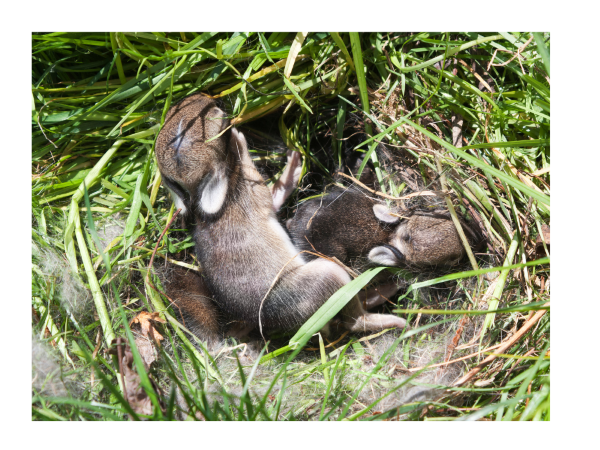
Can Baby Rabbits Have Herbs?
No, we never recommend feeding baby rabbits herbs.
This may seem surprising as we just learned about a handful of herbal treats that are chock full of beneficial nutrients, vitamins, and minerals for rabbits.
However, all baby rabbits are at a critical period of internal development and should only ingest mothers milk and eventually, some hay.
The GI tract of immature or baby rabbits is extremely particular and cannot properly digest or metabolize the more complex leafy herbs.
As such, it is very important to wait until your rabbit reaches 12 weeks of age before offering them any herb.
Even then, it is a best practice to start with one or two leaves of any herb within a 24 hour period. This allows you to observe your newly mature rabbit’s behavior and reaction to each herb.
With this method, you will also learn which herbs they like and which they don’t. In addition, this slow introduction will let you identify which herbs your rabbit cannot yet properly digest.
For example, if your newly mature rabbit experiences diarrhea or acts abnormally after trying rosemary, don’t offer them more rosemary, provide them with lots of good quality hay, and wait another few weeks before trying rosemary again.
Here’s a helpful video about Medicinal herbs for Rabbits!
Final Thoughts On Herbs That Rabbits Can Eat and The Best Herbs For Rabbits
Offering your rabbits herbs is a great way to add tasty variation while enriching their diets.
Remember that the best herbs for rabbits are those that we humans also enjoy, with some tricky exceptions when it comes to the more pungent herbs.
Leafy green herbs are naturally complex foods with a large array of vitamins and minerals. Be aware that immature baby bunnies cannot properly digest these components, in fact, leafy greens pose more of a health threat than a health benefit to immature rabbits.
Finally, the best rule of thumb is to check if an herb or other leafy green is rabbit safe before offering it to your bunny.
Fortunately, here at Hobby Farm Heaven, we have a large library that covers many different rabbit-safe herbs vs. plants and food toxic to rabbits, as well as other healthy rabbit treat options.
We want your rabbit raising experience to be the best, so be sure to check in with us about all your rabbit questions for happy and successful rabbit raising!
Finally, for the big picture on what foods rabbits and bunnies can eat, you can refer to this post:
What Can Rabbits Eat?

